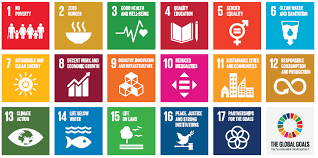The Importance of UN Sustainable Development Goals
In 2015, the United Nations adopted the Sustainable Development Goals (SDGs) to address global challenges and create a more sustainable future for all. These 17 goals cover a wide range of issues, from poverty and hunger to climate action and gender equality. Achieving these goals by 2030 requires collective action and commitment from governments, businesses, and individuals worldwide.
Key Areas of Focus
The SDGs are interconnected and aim to promote economic prosperity, social inclusion, and environmental sustainability. By focusing on areas such as clean energy, quality education, affordable healthcare, and reduced inequalities, the SDGs provide a roadmap for building a better world for present and future generations.
Role of Businesses
Businesses play a crucial role in advancing the SDGs through sustainable practices, responsible operations, and innovation. Companies that align their strategies with the SDGs not only contribute to global development but also enhance their reputation, attract socially conscious consumers, and drive long-term growth.
Individual Responsibility
While governments and businesses have a significant impact on achieving the SDGs, individuals also have a role to play. By making sustainable choices in daily life – such as reducing waste, conserving energy, supporting ethical brands, and advocating for positive change – everyone can contribute to the collective effort towards a more sustainable world.
Challenges Ahead
Despite progress in some areas, many challenges remain in achieving the SDGs by 2030. Issues such as climate change, poverty, inequality, and lack of access to basic services continue to pose significant obstacles. Addressing these challenges requires collaboration at all levels and a renewed commitment to sustainable development.
The Way Forward
As we work towards fulfilling the UN Sustainable Development Goals, it is essential to foster partnerships, promote innovation, and empower communities. By embracing the principles of sustainability in all aspects of society – from policy-making to everyday actions – we can create a more equitable, resilient, and prosperous world for generations to come.
Five Practical Tips to Support the UN Sustainable Development Goals
- Reduce energy consumption by turning off lights and electronics when not in use.
- Use public transport, carpooling or cycling to reduce carbon emissions from transportation.
- Support local and sustainable food sources to reduce your carbon footprint.
- Practice water conservation by fixing leaks and using water-saving appliances.
- Educate yourself and others about the UN Sustainable Development Goals to raise awareness and promote action.
Reduce energy consumption by turning off lights and electronics when not in use.
By reducing energy consumption through simple actions like turning off lights and electronics when not in use, individuals can contribute towards achieving the UN Sustainable Development Goals. This small yet impactful change promotes energy efficiency and helps combat climate change, aligning with the goal of ensuring access to affordable, reliable, sustainable, and modern energy for all. Embracing such practices in daily life not only conserves resources but also fosters a more sustainable future for our planet and communities.
Use public transport, carpooling or cycling to reduce carbon emissions from transportation.
By utilising public transport, carpooling, or cycling as alternative modes of transportation, individuals can significantly reduce carbon emissions associated with travel. Embracing these sustainable options not only helps mitigate the environmental impact of excessive vehicle use but also contributes to addressing climate change and promoting cleaner air quality. Making a conscious choice to opt for public transport, carpooling with others, or cycling not only benefits the environment but also fosters a more sustainable and eco-friendly approach to daily commuting.
Support local and sustainable food sources to reduce your carbon footprint.
Supporting local and sustainable food sources is a practical way to reduce your carbon footprint and contribute to the achievement of UN Sustainable Development Goals. By choosing locally produced food, you not only support small-scale farmers and businesses but also help reduce the environmental impact of transportation and packaging associated with imported goods. Embracing sustainable food practices can lead to a healthier planet and communities, aligning with the goals of promoting responsible consumption and combating climate change.
Practice water conservation by fixing leaks and using water-saving appliances.
By practising water conservation through fixing leaks and utilising water-saving appliances, individuals can contribute to the achievement of UN Sustainable Development Goals related to clean water and sanitation (Goal 6). Conserving water not only helps in reducing wastage but also promotes efficient use of this precious resource, ultimately supporting environmental sustainability and ensuring access to clean water for all. Making simple changes in daily habits, such as repairing leaks promptly and opting for water-efficient appliances, can have a significant impact on conserving water resources for a more sustainable future.
Educate yourself and others about the UN Sustainable Development Goals to raise awareness and promote action.
To make a meaningful impact towards achieving the UN Sustainable Development Goals, it is crucial to educate yourself and others about these global objectives. By raising awareness and promoting action on the SDGs, individuals can contribute to a collective effort towards a more sustainable and equitable world. Through education and advocacy, we can inspire positive change, foster collaboration, and empower communities to work together towards achieving the shared vision of a better future for all.

